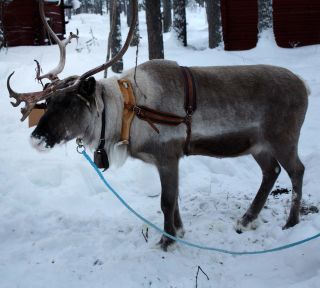Environment
Indigenous Reindeer Herders Experience Mental Distress
The mental health impact of losing land, heritage, and livelihood in Sweden.
Posted May 24, 2023 Reviewed by Lybi Ma
Key points
- Sámi reindeer herders in northern Sweden experience solastalgia, mental distress from environmental change.
- The Sámi have been oppressed historically and today’s changes add to their mental health difficulties.
- The people feel as if they are losing their world, with few positive pathways open.
Jokkmokk in northern Sweden straddles the Arctic Circle. Jenni Laiti introduces herself, describing her family and the place in which she belongs. She uses her indigenous language, Sámi, “We have been here together since the last ice age." Now, the planet warms, her land changes, and the Sámi endure solastalgia, meaning distress from environmental change.

Out of the more than 20,000 Swedish Sámi, about 10 percent herd reindeer, gaining food from the meat and clothes from the pelts. For Sámi people, living with reindeer is far more than humans exploiting animals. Laiti explains the entanglement: “We have a sacred relationship and we have a reciprocal relationship with each other” and “it’s a base for our culture and survival.”
Both ideas may be dying with the reindeer, as described by Laiti and Carl-Johan Utsi. One November day, 3000 reindeer were being herded across a frozen lake, as the Sámi have been doing for centuries. The ice broke. Scrambling for the shore, animals stood on each other, trampling some, while others drowned. Some 400 died that day as their herders watched helplessly. Compensation could never make up for the real loss, the mental devastation—and knowing that it could happen again and again and again.
A podcast called The End of This World relates these experiences against a backdrop of sounds from reindeer, ice, water, and weather. Within a two-year residency at the Wellcome Hub in London, the podcast was produced by Invisible Flock (a United Kingdom arts studio) with Jenni Laiti, Carl-Johan Utsi, and Land Body Ecologies.
The latter is an art-science collective in which I am involved, analyzing and documenting how forced environmental change affects the emotional and mental health of peoples around the world. We collaborate with local communities and their organizations to address their solastalgia and how they are ensuring that they respond to it on their own terms in their own ways.
It is not just current climate change. Dams provide hydropower to Sweden while logging creates jobs and income, both wrecking traditional reindeer pastures and migration routes. Wind farms reduce fossil fuel dependence yet require land as does ever-present extractivism. Less than 150 kilometers north of Jokkmokk, the town of Kiruna sits over what is termed the largest underground iron ore mine in the world. Removing this mineral has undermined parts of the town; the people voted to rebuild those sections nearby rather than stopping the mining. Earlier this year, Kiruna announced the discovery of the largest known deposit of rare earth metals in Europe.
Deeper than digging through the soil, the forests, and the water has been the hollowing out of Sámi culture. In past decades, the people were banned from speaking their language, denigrated as an inferior race, shamed for pursuing their culture and history, and forced to play the game of assimilation. From Utsi’s words, they were forcibly moved “like pieces of chess”. Both the government of Sweden and the Church of Sweden have now apologised to the Sámi people for these abuses.
Land rights, removed from the Sámi since at least the seventeenth century, are slowly being returned. Their country, called Sápmi, mixes the traditional and the modern. Reindeer husbandry and use continue, with dogs and skiing supported by all-terrain vehicles, snowmobiles, and helicopters. A vast tract has been designated the UNESCO World Heritage Site of the Laponian Area, generating income from tourism and crafts.
These gains are supplanted by uncertainties and deteriorating mental health. As Laiti intones, “We don’t know what’s going to happen next. And it frightens us. We get anxious, depressed, and we’re sad.” Beyond solastalgia, she continues, giving the podcast its title, “I haven’t heard if there is a word to describe the feeling when you lose your whole world.”
First, Sweden tried to remove their heritage. Then, resource extraction aimed to make the Sámi lose their land and animals. Now, rapid environmental change destroys their world. What is left for them to lose?
References
Gougsa, S., V. Pratt, B. George, C. Vilela, D. Kobei, S. Kokunda, I. Kelman, B. Eaton, L. Maina, S. Luari, O. Autti, K. Kerätär, J. Laiti, C. Baxendale, R. Raj, R. Deshpande, R. Gokharu, N. Singh, S. Ghelani, N. Mendu, A. Ahmad, and Land Body Ecologies research group. 2023. Land Body Ecologies: A case study for global transdisciplinary collaboration at the intersections of environment and mental health. The Journal of Climate Change and Health, vol. 10, article 100206.
Kelman, I. and M.W. Næss. 2019. Climate Change and Migration for Scandinavian Saami: A Review of Possible Impacts. Climate, vol. 7, no. 4, article 47.
Szpak, A. 2019. Relocation of Kiruna and construction of the Markbygden wind farm and the Saami rights. Polar Science, vol. 22, article 100479.
Szpak, A. M. Ochwat. 2021. The Saami and the Karen — common experience and differences: a comparative perspective. Asia Europe Journal, vol. 19, pp. 445-465.




